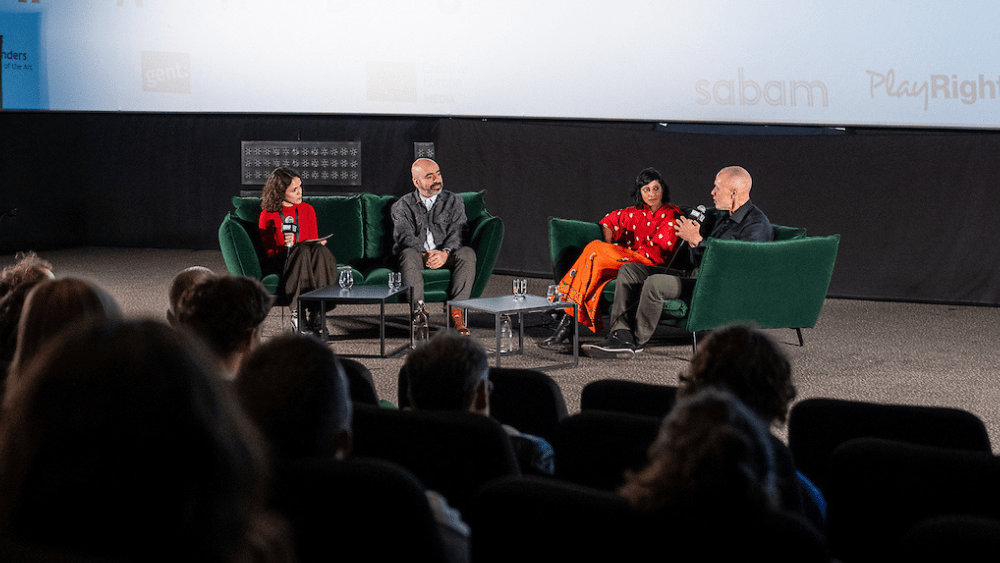Composers Diversity Collective, winners of this year’s World Soundtrack Awards Industry Award, attended a panel discussion at Music Days at the Ghent Film Festival to talk about their work and what still needs to be done in terms of diversity in the sector.
Members in attendance included founder Michael Abels (Get Out), co-presidents Sandro Morales-Santoro (Venom) and Amrita Vaz (They Charge for the Sun).
The WSA Industry Awards are presented to recognize individuals or organizations who have made lasting and meaningful contributions to the film music industry. CDC’s mission is to overcome barriers in “finding culturally diverse music creators, music supervisors, sound engineers, and musicians” and to “raise mutual awareness and dispel misconceptions about the stylistic range of minority composers.”
Asked about being this year’s recipient, Abels said he felt “very honored” to be in Ghent. “It’s brave for us as the World Soundtrack Awards to make a statement like this. We want to be a resource and a community, so having some form of international recognition is definitely our aim.”
Abels recalled the early days of the group’s formation after his first musical success in Jordan Peele’s Oscar-winning “Get Out,” saying he was “drawn into the whole world of music.” “I went to events and there weren’t many people who looked like me, so if there were, I made eye contact, like, ‘I see you,'” he added. “We said let’s go out, but often that doesn’t happen, so we just thought we had to choose a place and a time. We did it thinking we’d be successful if we got 10 people together, but there were 50 of us there. I think that spoke to the need for community and the need for us to feel like we’re part of something. It was born out of a spirit of community and representation.”
Vaz echoed that sentiment, saying there was a desire to “see ourselves reflected in each other,” but the group also grew out of another reality that people of color in the industry often face. “We heard over and over again, ‘Oh, we want to hire people of color, but there aren’t any composers.’ This inspired us to want to create a directory, because when you look around you see that there are great composers from all kinds of backgrounds. Our motivation was to get recognition not just for ourselves, but for us within the industry.”
Morales-Santoro, an immigrant from Venezuela, said his dream of composing film music felt “impossible.” “Then I saw Argentine composer Gustavo Santaolalla win back-to-back Oscars for his incredible scores, and I thought maybe someone like me could work in this industry. Twenty years later, with all the work we do, it’s still hard to find composers with my background scoring studio films. It’s a little sad and disappointing.”
An overriding theme in the conversation was the sense of regression that composers of color have felt in the past year when it comes to diversity. “Over the past 10 years, it seemed like there was a lot of opportunity for stories to be told that were outside the mainstream,” Abels said. “We’re witnessing a cultural shift right now. I can’t believe so many projects are being greenlit. This isn’t just an issue in the songwriting community. This is kind of an indication, if not an overt one, that diversity and inclusion aren’t as important as we thought 10 years ago. It’s really frustrating and sad.”
Vaz added that composers are often left out of diversity and inclusion projects because they often accept on-screen representation, and their behind-the-scenes roles are left on the back burner or not given enough consideration. “Even in intentional representation (diversity and inclusion) efforts like “Crazy Rich Asians,” the composer was not of Asian descent,” she says. “It’s the same with the live-action Mulan. We’re behind the scenes, so we’re not thought of in exactly the same way as the people in front of the screen.”
Asked what it’s like to champion diversity under the Trump administration in the United States, Morales Santoro said it’s “challenging.” “Political changes are bringing about something of a cultural shift in this country. But our work and mission remain the same. We continue to fight for the space we have earned and to make lasting changes that are not dependent on who is in power. During that time, we’ve managed to get a lot of very talented composers into the industry. You see guys like Amanda Jones doing amazing work like “Murderbots” and Michael Abels working on “Star Wars.” It’s incredible. ”
“We recognize that studios tend to be risk-averse, which is understandable to some extent because of the budget,” he added. “Magic happens when you take risks and you know your budget is in the hands of great creators. If you avoid risks, you end up with a very small group of composers being hired over and over again. The reality is that there’s only so much one person can do in a year. When you look at the people who write all that music, you see a great deal of diversity. The names that are recognized tend to be very homogeneous, but there’s a lot of diversity underneath.”
Vaz added to that thought by saying, “The studio isn’t doing anyone any favors.” “They want the best, they want things to run smoothly, they want you to deliver. Anyone who gets into that position has definitely earned that. The idea of diversity hiring is that no matter what the mainstream looks like, people on the outside have the resources to be there. I think it’s kind of an insidious concept that there’s no class. What I’d like to point out is that from a numbers standpoint, there are still very few people in TV and film. We still have a long way to go before people will offer us diversity hiring.”

